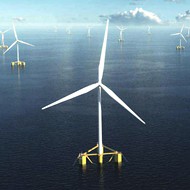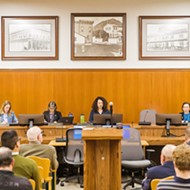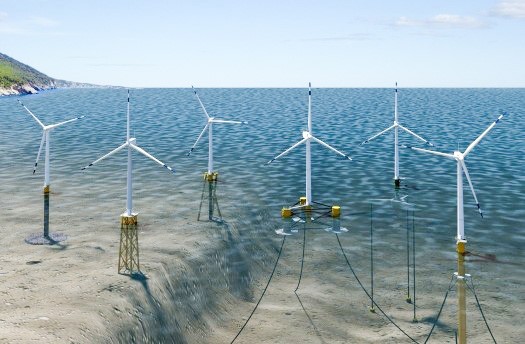[
{
"name": "Newsletter Promo",
"id": "NewsletterPromo",
"class": "inlineCenter",
"insertPoint": "4",
"component": "15264767",
"requiredCountToDisplay": "0"
},
{
"name": "Ad - Medium Rectangle CC01 - 300x250 - Inline Content",
"class": "inlineCenter",
"insertPoint": "8",
"component": "15582119",
"requiredCountToDisplay": "12"
},{
"name": "Ad - Medium Rectangle LC01 - 300x250 - Inline Content",
"class": "inlineCenter",
"insertPoint": "18",
"component": "15582122",
"requiredCountToDisplay": "22"
},{
"name": "Ad - Medium Rectangle 9 - 300x250 - Inline Content",
"class": "inlineCenter",
"insertPoint": "28",
"component": "15582121",
"requiredCountToDisplay": "32"
}]
Offshore wind farm resistance is ramping up along the Central Coast as protesters plead with SLO County's local governments to join them in opposition and file lawsuits to slow the planning process.
The Morro Bay Commercial Fishermen's Organization and the Port San Luis Commercial Fishermen's Association filed an initial lawsuit against offshore wind developers and the federal agency responsible for managing the farms in February. On Sept. 6, the groups filed a second lawsuit against developers and the California Coastal Commission to stop wind farm site evolution.
"Fishermen don't want offshore wind, especially now that it's grown to this monstrosity. It's not going to be good for our fisheries," group spokesperson Sheri Hafer previously told New Times. "This would just harm our whole culture."
In May 2022, the U.S. The Department of Interior auctioned off wind energy leasing areas in California with one roughly 20 miles off the coast of Morro Bay.
One of the companies awarded part of the leasing area was Atlas Wind, also known as Equinor, an international energy company present in 30 countries. Equinor is also the main defendant in both lawsuits.
Both fishermen organizations claim that the Bureau of Ocean Energy Management (BOEM) requires companies that bought leasing areas to have "an independent fisheries liaison" who's responsible for coordinating and communicating about wind farm site activities.
"The fishing liaison will work with fishing communities and the harbor districts to coordinate survey and other activities and to develop a process for reporting and remediating conflicts between mariners and survey vessels/equipment," the lawsuit reads.
The fishermen groups are claiming that both the California Coastal Commission and Equinor failed to inform them about the status of permits and other approvals issued by the Coastal Commission.
According to BOEM's website, Equinor is required to submit progress reports every six months until approval of a "construction and operations plan" with the intent of improving communication and transparency between local tribes and other interested parties, such as various fishing organizations.
"The intent of the progress report is to encourage lessees to identify and engage with underserved communities, including environmental justice communities that may be disproportionately impacted by the project's offshore activities, to avoid, minimize, and mitigate potential adverse effects," the website states.
Equinor has not yet submitted a construction and operations plan to BOEM but submitted its first and only progress report on Feb. 11.
Hafer and other activists attended the Oct. 1 Pismo Beach City Council meeting to express their concerns.
"This is going to be the most expensive form of energy that we can produce," Hafer said during public comment.
REACT Alliance President Mandy Davis agreed and told council members that the group's mission is to protect California's Central Coast from the destructive impacts of offshore wind energy development.
"We seek to educate the public, advocate for informing, mobilize the community, collaborate with governing officials, and pursue legal action, when necessary," she said. "This is something that every single person in our county should be interested in because if that offshore wind development were to go in, it would impact our entire county." Δ
Latest in News
Readers also liked…
-

When the levee breaks: Oceano residents, county officials walk a tightrope of regulations to manage Arroyo Grande Creek, which some say led to the levee's failure in January
May 18, 2023 -

Cal Poly report highlights offshore wind's potential to spur green energy transition
Jun 8, 2023 -

Cal Poly students demand rent control, accountability for substandard housing from SLO City Council
Jun 22, 2023









